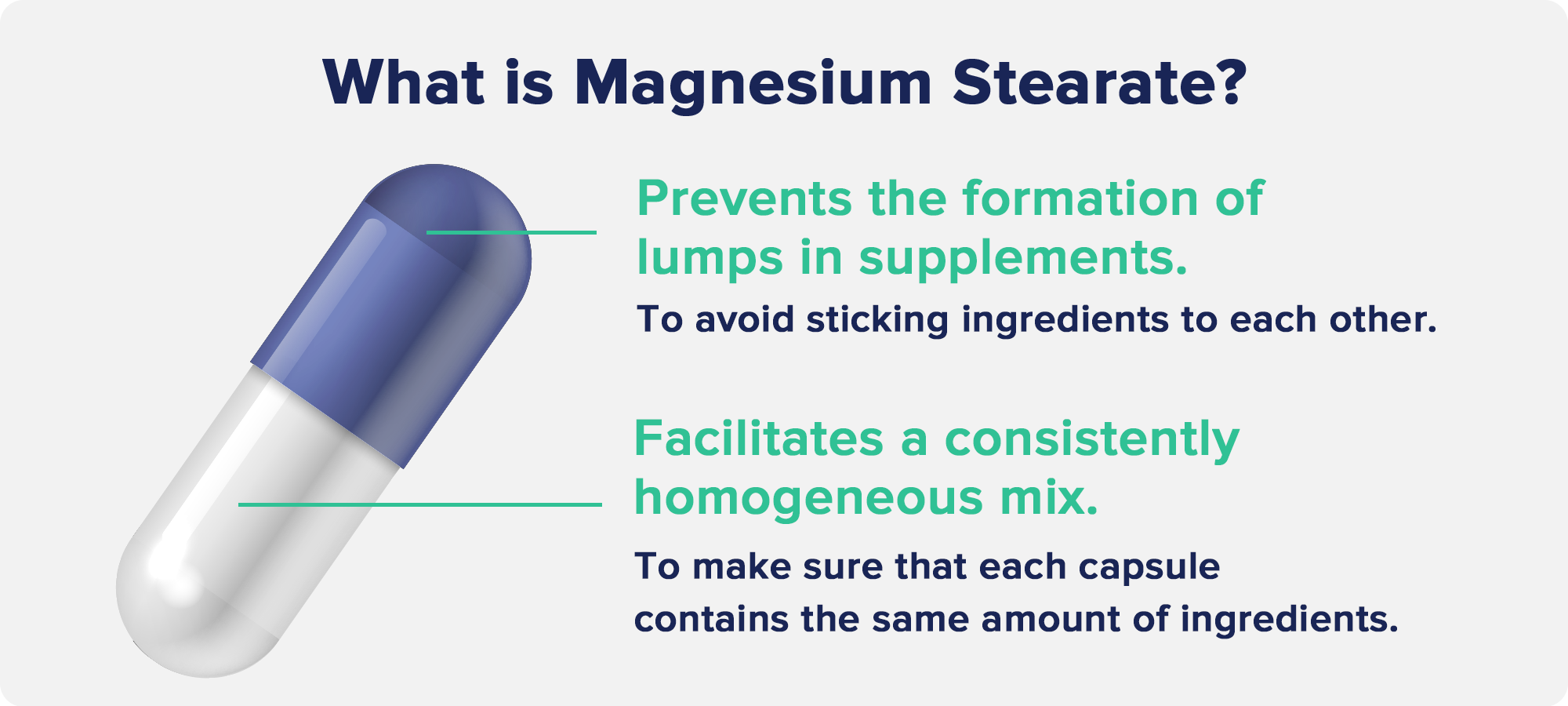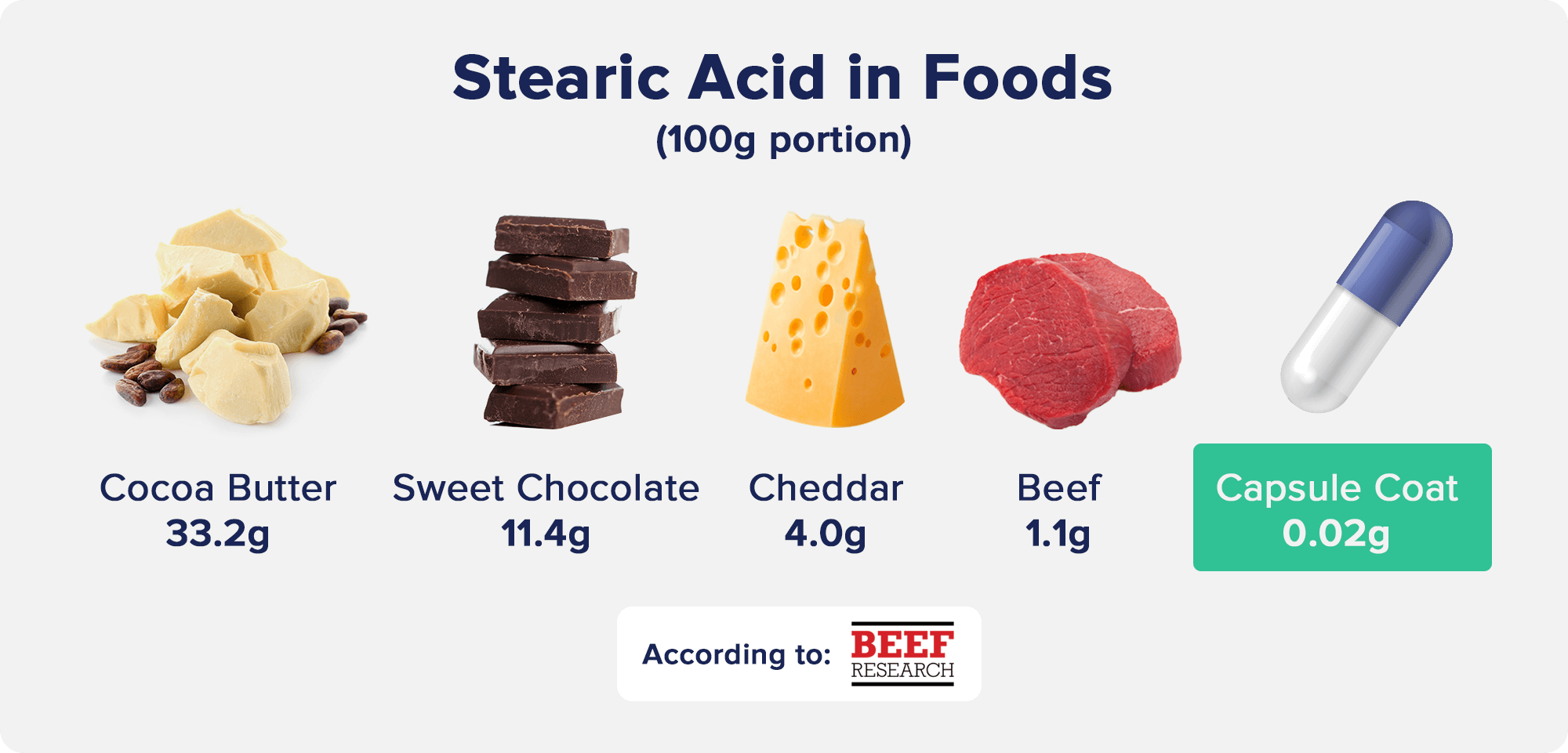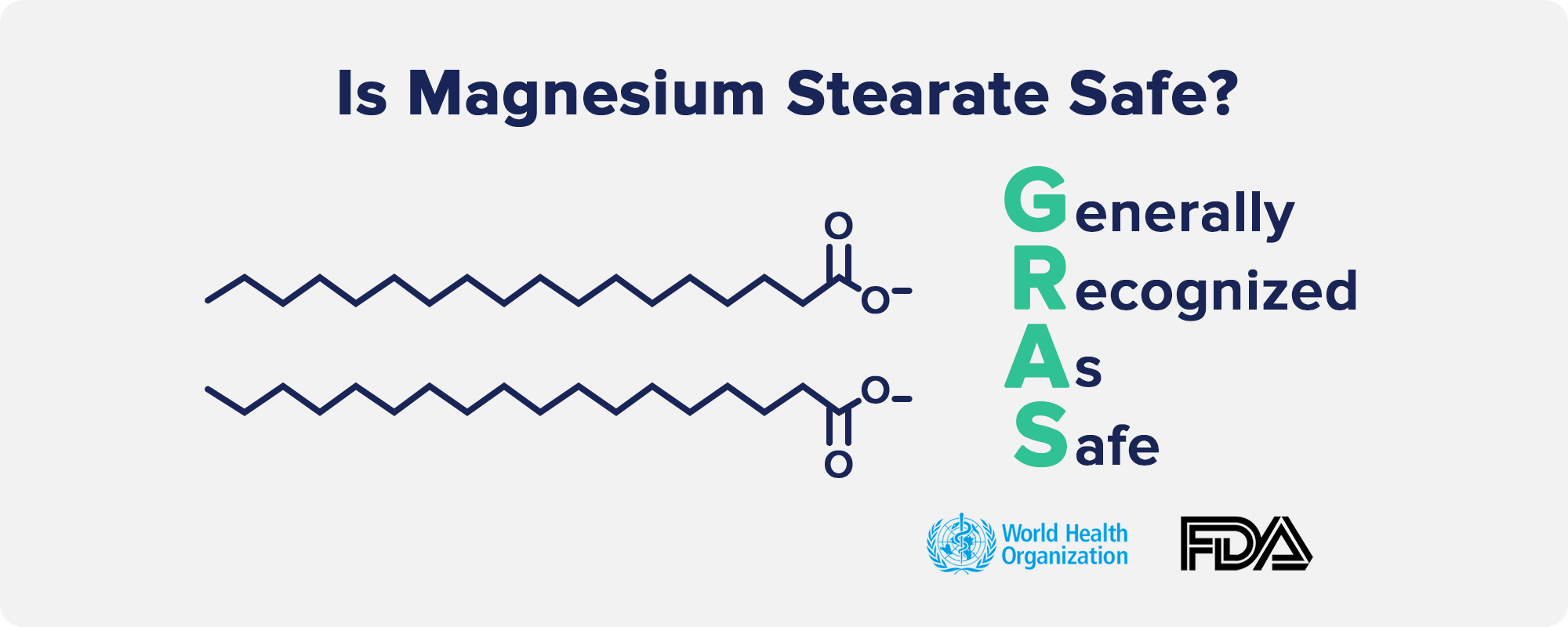Talk to a Registered Dietitian and use INSIDER20 for 20% off!
Talk to a real Dietitian for only $99: Schedule Now
This post contains links through which we may earn a small commission should you make a purchase from a brand. This in no way affects our ability to objectively critique the products and brands we review.
Evidence Based Research To fulfill our commitment to bringing our audience accurate and insightful content, our expert writers and medical reviewers rely on carefully curated research.
Read Our Editorial Policy
If you’ve ever taken dietary supplements, you’ve likely consumed magnesium stearate—a common ingredient used in capsules, powders, and many food products.
But despite its prevalence, many people wonder what magnesium stearate actually is and if it has any health benefits or risks—let’s find out.
Magnesium stearate is a magnesium salt of stearic acid—essentially, a compound combining two stearic acids and magnesium.
Unlike other forms of magnesium that are used to support sleep or muscle recovery, magnesium stearate is only used in minuscule amounts as a food or supplement additive.
You may also see it by other names, including “vegetable stearate,” “vegetable magnesium,” or sometimes simply “stearic acid.”
Magnesium stearate is so commonly used to coat tablets or capsules because it acts as a lubricant or “flow agent” that prevents ingredients from sticking to mechanical equipment, speeding up production.

In addition to supplements, magnesium stearate is found in powders, confectionery products, baking ingredients, chewing gum, and herbs and spices, where it can be used as an emulsifier or an agent for binding, thickening agent, anti-caking, or anti-foaming.
Lastly, magnesium stearate can be used as an excipient—a compound that helps enhance the therapeutic effect of the active ingredient of supplements or medications to promote absorption and utilization.
As mentioned, the “stearate” part of magnesium stearate comes from stearic acid—a saturated fatty acid found in many common foods.
Stearic acid is found in:
Although stearic acid is a saturated fat, it has not been shown to affect cholesterol levels negatively.
According to the USDA, the average American consumes 5,900-8,800mg of stearic acid per day from food sources like beef, cocoa, poultry, and cheese—yet the average amount of stearic acid in magnesium-stearate-coated supplements is less than 20mg.
As stearate can come from animal or plant sources, you may want to ensure that your supplement or food product is made from vegetable stearate if you are a vegan or vegetarian.

Some people have raised concerns that magnesium stearate can cause adverse health effects, including impaired immune function, exposure to pesticides, or inhibition of nutrient absorption.
However, these claims have largely been debunked, and most scientists believe that magnesium stearate in supplements is not a cause for concern—especially because of the minuscule amount consumed.
One oft-cited study from those speaking out against magnesium stearate is a lab study from 1990 that states magnesium stearate suppresses the immune system.
The study was done with immune cells from mice that were “bathed” in large amounts of stearic acid—not even magnesium stearate—and they found that stearic acid damaged cell membranes of immune cells called T-lymphocytes.
However, this is not what would happen in the body with small amounts of magnesium stearate, as mouse cells don’t metabolize fatty acids the same way humans do, and the study only used stearic acid.
A more recent study from 2017 was published in Toxicology Reports, concluding, “These data indicate a lack of genotoxic risk posed by magnesium stearate consumed at current estimated dietary exposures. However, health effects of cumulative exposure to magnesium via multiple sources present in food additives may be of concern and warrant further evaluation.”
Therefore, consuming excessive amounts of magnesium stearate may cause health risks, but it would be unlikely to reach those amounts.
One reputable supplement brand, NOW Foods, is confident in their use of magnesium stearate, stating, “Just like other chelated minerals (magnesium ascorbate, magnesium citrate, et al.), [it] has no inherent negatives based on its being in a stable neutral compound comprised of a mineral and a food acid (vegetable sourced stearic acid neutralized with magnesium salts).”

Magnesium stearate is generally recognized as safe (GRAS) by the FDA, and the World Health Organization has also confirmed the safety of magnesium stearate.
However, one group of people who should stay away from magnesium stearate are those with allergies to stearic acid, as consuming it could cause rare but severe allergic reactions.
To close out the safety issue, a study with rats concluded that you’d have to take 2,500mg/kg of magnesium stearate to start seeing toxic effects——translating to the astronomical amount of 170,000mg per day for a 150-pound person.
There is no substantial evidence that magnesium stearate negatively affects the human body.
High doses of magnesium stearate (which are difficult or impossible to achieve) may cause adverse effects, including impaired immune function.
Otherwise, magnesium stearate is not likely to do anything in the body.
Magnesium stearate is commonly used to coat tablets or capsules because it acts as a lubricant or “flow agent” that prevents ingredients from sticking to mechanical equipment, speeding up production.
It’s not thought that magnesium stearate is harmful in supplements due to the minuscule amounts that are used.
No, Epsom salt is magnesium sulfate, not magnesium stearate.
Magnesium stearate is synthetic or artificially made—although its two parts, magnesium and stearic acid, are found in nature.